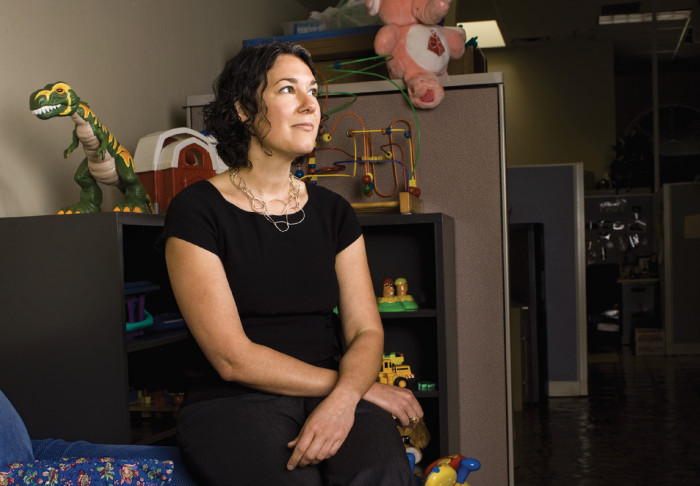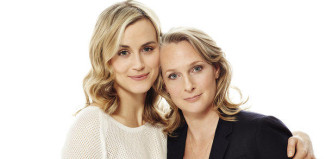After spending just a few minutes with Allison Daskam, one thing is clear: she’s a glass-half-full kind of woman.
“At the end of the day when I go home, I know my work is contributing to the greater good and I believe in that,” said Daskam, communications manager for the Austin -based nonprofit organization Any Baby Can. “It’s evident every day that this organization is doing good.”
The heart of Daskam’s job is telling stories and conveying the organization’s mission and its work to Central Texans.
“It feels like a privilege to do that. I get to tell our community about these successes,” she said.
Daskam is no stranger to the world of nonprofits. A native of Granbury, Texas, she moved to Austin after graduating from Texas A&M university. She has worked with several Central Texas organizations, including the Texas Council on Family Violence’s national domestic Violence Hotline, Waterloo counseling center and candlelight ranch.
Daskam said the same challenges and successes she encountered in working with nonprofits drew her to Any Baby Can.
“Yes, there are people struggling in our community and there are hardships, but there are incredible resources here and people in our community dedicated to making Austin a better place to live, making Central Texas a better place, and helping people who do need a little help.”
Any Baby Can, which formed in Austin in 1992 and merged with the center for development, education, and nutrition Family Resource Center in 2003, serves about 6,000 Central Texans each year, with a stated mission of reaching “the youngest, sickest and poorest children and their families” in the area.
That work includes services from prenatal and parenting education to early developmental services, child abuse prevention, and medical case management and support for families of children with special needs and critical illnesses. The organization serves “children and families, period,” Daskam said, without prescribing a definition of what a family is. As such, its clients at any one time may include families made up of single parents, same-sex couples, and grandparents or extended family caring for children. “What’s more, the organization’s staff is as diverse as the people it serves,” she said, “and that diversity is celebrated among staff members.”
Although the nonprofit serves families in Travis, Hays, Williamson and Bastrop counties, the bulk of its clients reside in Travis County, and most of those hail from the east side of Austin. While the organization works with any family who needs its help, regardless of income, more than 75 percent of its client families earn less than 150 percent of the federal poverty income level – which in 2009 was $22,050 per year for a family of four.
“That 6,000 number, it’s a pretty incredible number,” Daskam said. “But really, we’re hitting the tip of the iceberg. There’s so much more that could be done, and that’s what we as an organization strive for. That drives everyone here. We want to get to the rest of the iceberg.”
According to Daskam, tenacity and passion are characteristic of the families the organization serves, and it’s nothing short of inspiring to work with families who want to provide the best life for their children. One parent in particular exemplified that for Daskam: a young mother whose son faced myriad challenges at birth.
That mother, Naesha, was seven course credit hours away from earning her bachelor’s degree when her son Avery arrived prematurely. Along with a host of health problems that can plague premature babies, the baby also had cerebral palsy and lung disease. Naesha stopped taking classes to dedicate her time and resources to Avery, who spent his first eight months in the hospital’s newborn intensive care unit. During that time, Naesha stayed at the hospital until visiting hours ended, then slept in her car in order to arrive as soon as possible the next morning.
But once Avery was released from the hospital, he and his mother faced more challenges, including finding housing, getting the necessary medical equipment and navigating the Medicaid system.
When Any Baby Can started working with Naesha and Avery, Naesha had two goals: to go back to school and to see Avery walk. After working with the organization and receiving funding from the Austin American-Statesman’s season of caring campaign with help from any Baby can, she now has her bachelor’s degree in biology and is in nursing school. Avery is currently learning how to walk.
“Her resilience is incredible,” Daskam said. “Avery is an incredible little boy, and to see someone with that tenacity, that drive, is absolutely inspiring because Naesha’s undaunted. I like her story so much because it exemplifies so many things about the families we serve.”
Daskam points out that beyond inspiration and hope, the work of the families and Any Baby Can impacts the community as a whole, extending even to those who don’t have children.
“Beyond the fact that we serve children and families, why does this matter to the gay community?” Daskam asked. “Even if they don’t have kids, the return on investment on these services is staggering.”
According to any Baby can, for every dollar invested in early childhood development, the Central Texas community saves $17.
“Even if those issues aren’t close to their hearts, that (return on investment) affects everyone,” Daskam said, “and those costs affect everyone if the investment isn’t made. You’re going to be affected by this regardless of your involvement in it.”
For Daskam, the fact that Any Baby Can does not define a family’s composition is important on a personal level. Daskam said her love of the Austin community would likely draw her toward the nonprofit’s work regardless of her sexual orientation because of the positive impact its work has on the entire area. She added, however, that she would one day like children of her own and has hopes that more organizations and individuals will also recognize same-sex families with the same considerations as straight families also makes Any Baby Can’s mission near to her heart.
“Any family could receive help,” Daskam said of the organization. “And I’m very attracted to that, not prescribing what a family looks like, and it’s my hope that we all do that one day.”




































